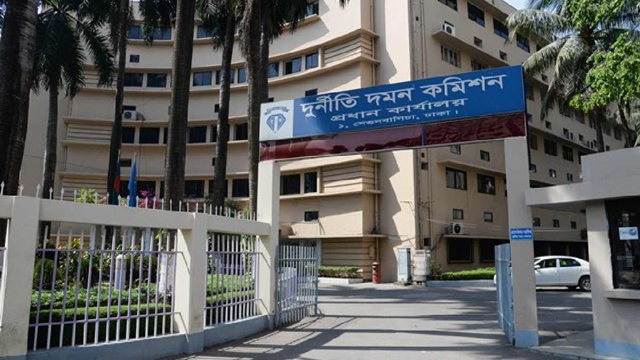FT Online
Published:2019-05-21 20:46:10 BdST
ACC operated within “comfort zone targeting small fry” in 2018
The Anti-Corruption Commission, country’s principal organ for fighting graft, was less actively engaged in fulfilling its stated function in 2018, as evidenced by a fall in the number of inquiries, investigations and charge-sheets it executed during the year, compared to 2017.
The ACC, however, contends it was more qualitatively engaged in graft-busting during the year.
According to the ACC’s own data gleaned from its recently released annual report, some 3,427 complaints were submitted to the commission during 2018, of which it completed inquiries into 827 - around a quarter. In 2017, it completed inquiries into 1,445 out of 18,000 complaints it received.
The ACC went on to file some 216 cases during 2018, against 273 in 2017.
The ACC also completed 489 investigations in 2018, almost half the number it did in 2017, when it completed 965. This number includes investigations that may have been initiated in previous years.
The commission’s own data shows that it submitted 236 charge-sheets during 2018, against 382 in 2017.
ACC Public Relations Officer Pranab Kumar Bhattacharya told UNB that the case rate is going down as they are paying attention to ‘quality investigation. “We’ve no shortage of resources but officials are assigned to submit quality investigation reports.”
During a press briefing after submitting the ACC’s annual report to President Abdul Hamid on May 13, ACC Chairman Iqbal Mahmood also said that the commission was looking into the quality of investigations to ensure “100 percent success rate” in the trial of corruption cases.
Iqbal Mahmud also emphasised the need to eliminate corruption at the lowest level of the administration and said it becomes difficult to take action when lowly-ranked corrupt officers become influential.
The ACC chief said, "The majority of Bangladeshis live in rural areas. Villagers don't have access to the DCs, SPs. They think low-level officers can help solve their problems. We need to pay attention to stop corruption at the lowest level."
"When we go to catch these people, we’re told that they’re insignificant. The media then says we've only caught small fry. But the people of the country want to stop small-time, field-level officials from engaging in corruption," he added in favour of this ‘bottom-up’ as opposed to ‘top-down’ approach.
Dr Iftekharuzzaman, Executive Director of Transparency International Bangladesh (TIB), said ACC still has a big scope to expand its professional skills towards performing better in their investigations, in keeping with a large, well-funded and resourceful institution, instead of chasing after “small fry”.
“They can work for increasing the skills of the officers of the investigation team through modern training and updated knowledge to relentlessly combat, control and prevent corruption, as corruption is a sophisticated crime,” Dr Iftekharuzzaman said.
Playing down the numbers released by the ACC, he said, “Number is no matter. What matters is who is included in the case. They (ACC) are only busy catching the small fry. They need to open the cases against the big fish. If the ACC can do the job properly, people will trust them.”
Expressing a skeptical view of the recent emphasis on “preventive” activities by the ACC, Dr Iftekhar said, “Conducting programmes for the prevention of corruption and promotion of best practices is all very well, but spending disproportionate time in such activities will itself be a bad practice as they must keep in mind the ACC’s responsibilities and its mandate to carry out inquiries and investigations and to execute its duties as a prosecuting agency.”
He also stressed the need for transforming the ACC into a constitutional body, as opposed to a statutory one created through the Anti-Corruption Commission Act 2004, in order to guarantee its total independence.
“The ACC should be completely an independent, autonomous and constitutional body to perform well,” he said.
Unauthorized use or reproduction of The Finance Today content for commercial purposes is strictly prohibited.


